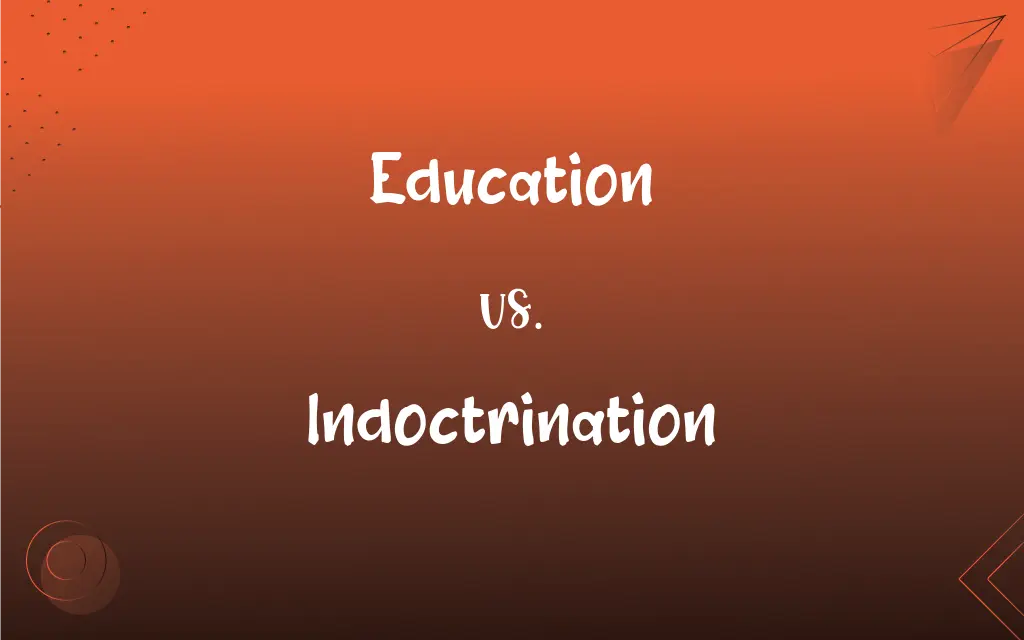Education vs. Indoctrination: What's the Difference?
By Janet White || Published on November 25, 2023
Education involves critical thinking and learning diverse perspectives, while indoctrination imposes a set ideology without encouraging questioning or debate.

Key Differences
Education is a process that encourages critical thinking, questioning, and understanding of diverse views. In contrast, indoctrination involves imparting a specific set of beliefs or ideologies, often discouraging questioning or deviation.
The goal of education is to impart knowledge and foster independent thought and analysis. Indoctrination, on the other hand, aims to instill a particular viewpoint or ideology, often with little regard for critical examination.
Education typically involves a broad curriculum that covers various subjects and perspectives. While, indoctrination tends to focus on a narrow set of ideas, often promoting a singular perspective.
In education, teachers encourage students to explore and challenge ideas. In indoctrination, the teaching approach is often one-sided, discouraging dissent or alternative viewpoints.
The outcome of education is usually individuals who can think independently and form their own opinions. The outcome of indoctrination is often individuals who adhere strictly to a specific set of beliefs or ideologies.
ADVERTISEMENT
Comparison Chart
Objective
To foster critical thinking and knowledge
To instill specific beliefs or ideologies
Approach
Encourages questioning and exploration
Often one-sided and discourages questioning
Curriculum
Broad and diverse
Narrow and focused on specific ideas
Teaching Method
Interactive and exploratory
Directive and prescriptive
Outcome
Independent thinking and diverse opinions
Uniform beliefs and limited questioning
ADVERTISEMENT
Education and Indoctrination Definitions
Education
Education is the development of knowledge, skills, values, and habits.
Education in schools builds a foundation for future success.
Indoctrination
Indoctrination is often associated with brainwashing or manipulation.
Critics accused the organization of indoctrination rather than education.
Education
Education involves a structured teaching and learning process.
Online education has become increasingly popular in recent years.
Indoctrination
Indoctrination is the process of teaching a person or group to accept beliefs uncritically.
The regime used media for the indoctrination of its ideologies.
Education
Education is the act of imparting knowledge or skills.
Her passion for education led her to become a teacher.
Indoctrination
Indoctrination involves imparting specific doctrines or ideologies.
Religious indoctrination in the school raised concerns about impartiality.
Education
Education refers to an enlightening experience.
His travel experiences provided him with a valuable education in cultural diversity.
Indoctrination
Indoctrination is the instruction in a doctrine or ideology, especially dogmatically.
The pamphlets were used for political indoctrination.
Education
Education is the process of receiving or giving systematic instruction.
Her education at the university expanded her worldview.
Indoctrination
Indoctrination means teaching someone to accept beliefs without skepticism.
His speeches were more about indoctrination than information.
Education
The act or process of educating or being educated.
Indoctrination
To instruct in a body of doctrine or principles.
Education
The knowledge or skill obtained or developed by a learning process.
Indoctrination
To imbue with a partisan or ideological point of view
Children who had been indoctrinated against their parents' values.
Education
A program of instruction of a specified kind or level
Driver education.
A college education.
Indoctrination
The act of indoctrinating, or the condition of being indoctrinated
Indoctrination
Instruction in the rudiments and principles of any science or belief system; information.
Indoctrination
The act of indoctrinating, or the condition of being indoctrinated; instruction in the rudiments and principles of any science or system of belief; information.
Indoctrination
Teaching someone to accept doctrines uncritically
FAQs
Can indoctrination occur in educational settings?
Yes, if teaching becomes one-sided and critical questioning is discouraged.
Is education always objective?
Ideally, but it can be influenced by cultural or ideological biases.
Does indoctrination allow for different viewpoints?
No, it often promotes a singular perspective.
What is the main goal of education?
To impart knowledge and promote critical thinking.
Can education include teaching values?
Yes, but it typically allows room for questioning and differing values.
Is indoctrination always negative?
It's often viewed negatively due to its lack of critical engagement.
Is education important for democracy?
Absolutely, as it encourages informed participation in democratic processes.
How can one identify indoctrination?
By noticing a lack of critical dialogue and questioning.
How does indoctrination differ from education?
Indoctrination imposes beliefs, while education encourages independent thought.
How does education impact society?
It fosters informed and critical citizens, essential for a healthy society.
Does indoctrination affect critical thinking skills?
Yes, it can hinder the development of critical thinking.
Can education be free from all biases?
It's challenging, but the aim is to minimize biases as much as possible.
Is learning different cultures part of education?
Yes, it broadens understanding and promotes global awareness.
How does indoctrination impact freedom of thought?
It restricts it by promoting a narrow set of beliefs.
Can indoctrination be subtle?
Yes, it can be subtle and not always immediately apparent.
Does education evolve over time?
Yes, it changes with new knowledge and societal needs.
Is education a lifelong process?
Yes, it continues beyond formal schooling throughout life.
Are teachers key in preventing indoctrination?
Yes, by promoting a balanced and critical approach to teaching.
Can indoctrination lead to closed-mindedness?
Yes, as it discourages questioning and exploring different ideas.
Can indoctrination be part of religious teaching?
It can be if it involves uncritical acceptance of specific doctrines.
About Author
Written by
Janet WhiteJanet White has been an esteemed writer and blogger for Difference Wiki. Holding a Master's degree in Science and Medical Journalism from the prestigious Boston University, she has consistently demonstrated her expertise and passion for her field. When she's not immersed in her work, Janet relishes her time exercising, delving into a good book, and cherishing moments with friends and family.






































































